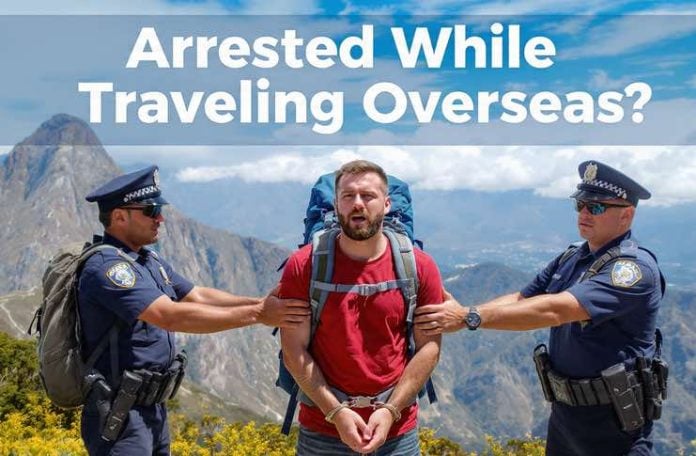
You planned to collect passport stamps, not police mugshots — but life sometimes throws a plot twist worthy of a Netflix drama. Whether it’s a misunderstanding at customs, a mix-up over local laws, or just being in the wrong place at the wrong time, finding yourself arrested abroad is every traveler’s nightmare. Don’t panic (yet)!
Contacting an international criminal law barrister may not be something you thought you’d need—but if you or someone close to you is arrested abroad, their expertise could make all the difference. Facing legal issues in a foreign country is stressful, confusing, and potentially life-altering.
Legal systems differ widely across borders, and navigating unfamiliar laws without proper representation can lead to disastrous outcomes.
In this guide, as part of our travel tips and advice, we’ll walk you through what to do, who to call. But before we delve into it, watch this video to learn how to stay away from getting arrested when traveling overseas:
1. Know Your Rights Abroad Aren’t the Same as at Home
The first and most important thing to understand is that your rights abroad are not automatically the same as those in the US or UK. The legal protections you take for granted—such as the right to remain silent, access to a solicitor, or protection against indefinite detention—may not exist in the same form elsewhere.
Each country has its own criminal justice system, and some may have different evidentiary standards, longer pre-trial detentions, or harsher penalties. Some countries also have stricter drug laws, limited bail options, or laws around political expression that differ significantly from the UK.
The UK Government’s foreign travel advice outlines the legal climate in most countries and is a vital first stop if you’re facing legal trouble or are supporting someone who is.
Watch this video to learn more:
2. Contact Your Embassy or Consulate Immediately
If you’re arrested or detained abroad, your first move should be to contact the nearest embassy, consulate, or high commission. They can provide:
- A list of local English-speaking lawyers.
- Contact with family or friends back home.
- Information about local prison conditions and what to expect.
While they cannot get you out of jail or intervene in legal proceedings, they can help ensure you are treated in line with local laws and that your rights are respected.
If you’re a UK citizen, for example, the UK Government’s help if you’re arrested abroad page explains what consular staff can and cannot do, and how they can support you through detention and court processes.
Watch this video to learn more:
3. Why You Need a Specialist International Criminal Law Barrister
While local legal advice is essential, an international criminal law barrister brings added expertise in cross-border legal matters, extradition law, and human rights protections. They can:
- Coordinate with local legal teams to ensure due process.
- Advise on the UK’s obligations (if you’re a UK citizen) under international treaties.
- Help prevent unlawful extradition or prolonged detention.
- Represent your interests if proceedings cross into the UK jurisdiction (if you’re a UK citizen).
Barristers with international experience often understand the nuances of specific foreign legal systems and have contacts with overseas law firms. This can be crucial in speeding up legal processes and identifying irregularities.
For example, the Fair Trials charity advocates for global legal fairness and offers resources on how international cases should be handled in line with human rights standards.
4. Preserve All Documentation and Communications
As soon as you’re detained or learn of someone’s arrest, begin keeping copies of all documents, including:
- Charge sheets and court orders.
- Correspondence with embassies or legal teams.
- Medical records or evidence of mistreatment.
This information can be essential for building a defence, contesting extradition, or raising concerns with human rights organisations if necessary.
Equally important is maintaining a detailed timeline of events. A barrister working on your case will need to understand when key events occurred, who was involved, and whether any procedures were breached.
If you are able to communicate by phone or email, keep copies of everything and back up files securely. If you’re supporting someone in detention, help them compile and organise this information.
5. Prepare for the Long Haul
International criminal cases are rarely resolved quickly. Be prepared for delays, multiple hearings, and extended periods of uncertainty. Your barrister can help manage expectations, explain legal terminology, and advise on next steps—whether negotiating plea agreements or challenging proceedings.
It’s also important to consider the emotional toll. Arrests abroad can result in isolation, anxiety, and distress for both the individual and their family. Seek support through organisations like Prisoners Abroad (if you’re a UK citizen) – which helps British citizens detained overseas and their families cope with the challenges.
6. Consider Extradition Risks
In some situations, the foreign country may request extradition to another jurisdiction. Extradition law is complex and governed by multiple treaties, including the European Arrest Warrant and bilateral agreements.
An international criminal law barrister can challenge extradition requests on several grounds:
- Human rights concerns.
- Risk of unfair trial.
- Political motivation.
- Inhumane prison conditions.
Each case is unique, and early legal input is crucial. Mistakes in this area can lead to years of legal limbo or even removal to a country with questionable legal protections.
In the UK, for example, the Crown Prosecution Service (CPS) provides an overview of how extradition works and when it may apply.
7. Act Quickly—But Thoughtfully
When facing a foreign legal system, time matters. The sooner you secure legal help, the more likely you are to protect your rights and achieve a fair outcome. However, rushing into agreements or signing unfamiliar documents can backfire.
Don’t plead guilty to “get it over with” unless advised by your legal team—it could lead to travel bans, large fines, or criminal records that follow you home. Your barrister will help you understand the long-term consequences of every decision.
8. Communicate Regularly and Honestly
Trust between client and barrister is key. Be honest about what happened, even if it’s difficult. Details matter in building your defence or seeking diplomatic intervention.
Also, maintain communication with family and supporters. They can liaise with consulates, gather documents, and help coordinate legal and emotional support.
Final Thoughts: Your Rights Still Matter
Being arrested abroad is frightening—but it doesn’t mean you’re powerless. With timely, specialist legal help and the right support network, you can navigate the process, challenge unfair treatment, and seek justice.
An international criminal law barrister is your ally in a system where the rules may be unfamiliar, but your rights still matter.
This article is for informational purposes only and should not be considered legal advice. For case-specific support, consult a qualified barrister or solicitor experienced in international criminal law and extradition cases.









